I made the mistake of commenting intelligently on a thread populated by very ignorant people…
8 minute read
December 12, 2014, 11:07 AM
…and for that, I am filled with regret. I thought that perhaps these people would be able to respond to some level of reason. I was quite wrong on that point. This time, it was on the “Wilson Memorial Hornets Football” page on Facebook. I don’t remember how I ended up landing on this page, since I don’t really care about Augusta County high school sports, but somehow, there I was.
For those not familiar, Wilson Memorial High School is located in Fishersville, Virginia. The school was built at the same time as Stuarts Draft High School, i.e. where I went to high school, and is identical to Stuarts Draft architecturally. The two schools are traditionally rivals, and play each other every year in football, though now, I believe, as an exhibition game, since the two schools are now in different conferences.
This Facebook page for Wilson football, however, has been a bit controversial. On December 6, the page’s owner made the following post:
In the comments for this post, someone named Rebekah Johnson said this:

The gist of it all is that Johnson was responding to the “faith” part of the post. Wilson is a public school, and is thus funded primarily by tax dollars. So an explicit endorsement of religion from the school would be a major no-no. On its face, whether or not the page owner intended the inclusion of “faith” in the original post to be a religious statement is debatable, but Johnson took it as such, which I consider a reasonable interpretation, though not the only one that I can think of. Taking it as she did, her argument was reasonable enough, though I probably would have phrased it a bit more politely than that. That comment generated some responses, first from the page:

So now it comes out: this is not, in fact, a page operated by or otherwise affiliated with the school. That does change things. Interesting. Then the other responses mostly came out like these two:

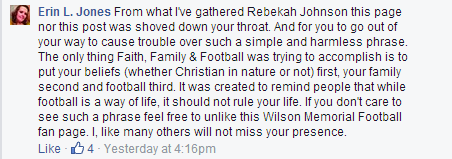
On the first note, the First Amendment, which Chris Robinson cites, reads as such:
Congress shall make no law respecting an establishment of religion, or prohibiting the free exercise thereof; or abridging the freedom of speech, or of the press; or the right of the people peaceably to assemble, and to petition the Government for a redress of grievances.
The key word here is “Congress”. Therefore, we’re speaking about governmental bodies (applied to state law in 1947 with Everson v. Board of Education) when it comes to the First Amendment. But since this page is not affiliated with the school or any other governmental organization, the First Amendment doesn’t apply since we’re dealing with private entities here. The government is not going to get involved in this discussion, but I, as another private entity, have every right to call them an idiot if I choose.
Then regarding the second comment by Erin L. Jones, that posits an alternate interpretation of the faith-family-football wording. Note, however, the unnecessarily confrontational tone, along with the “get lost” type of sentiment conveyed by both Jones and Robinson, as well as the page owner.
One would think, however, that the discussion would stay within the confines of the faith-family-football post and die out on its own. And if you thought that, you would be incorrect. The page owner then decided to fan the flames a little bit more, posting this along with a screenshot of Johnson’s post:
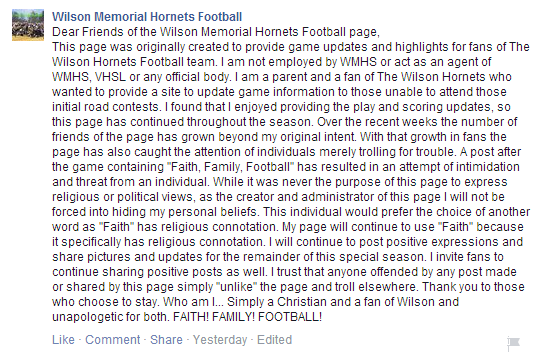
What drives people to make these sorts of posts that fan the flames over a discussion that was contained within a single thread? The discussion would have died out on its own in a day or so, but why should that stop the drama train? At this point, I felt compelled to add my two cents about the whole thing:
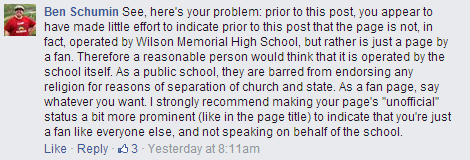
(And yes, that first sentence received the stamp of approval from the Department of Redundancy Department.)
If this sort of advice sounds familiar, it’s because I discussed it in this space back in January, at that time framing it in terms of the infamous “my opinions are my own” social media disclaimer. In this case, the same concept of branding yourself properly still holds, but it’s about indicating that you’re a fan-made page vs. anything official. When people would make fansites on the Web back in the day, it was fairly clear that they were fansites, mostly due to rather amateurish design. But with Facebook, pages get a pretty standardized look, making it harder to tell who is who. In this case, I came to the conclusion that a reasonable person would confuse this for an official school-endorsed page. I know that I, for one, did.
When I made my post, I was trying to help explain and offer advice going forward. The replies made it abundantly clear that I had wasted my time. The first comment came from the page owner:

Apparently “high school” is a magic word that denotes that a page is official? That’s news to me. It’s not like I’ve never seen schools drop the type of institution that they are when referring to their athletic teams in an official capacity. “Stuarts Draft Cougars” and “James Madison Dukes” have both been used officially by those entities. Therefore, would it not seem reasonable that a page titled “Wilson Memorial Hornets Football” would be an official page? Brand yourself accordingly.
Then Scott Wakefield had this to say:

Considering that we’re talking about a public school here, I’m going to read “public schools” into this, even though Wakefield did not say this explicitly. That said, wow. Just wow. Kind of reminds me of the “keep your government hands off my Medicare” bit from a few years ago, where someone didn’t recognize that Medicare is a government program to begin with. Likewise, the public school system is an arm of the local government, and as such is not allowed to officially sanction any religion or religious activities.
On that note, I always find it interesting that the people who advocate for these sorts of things always conveniently forget that nothing is stopping anyone from being religious in a public school on their own. The school can’t lead a prayer or conduct other religious activities in an official capacity, but nothing is stopping someone from individually praying at the beginning of the school day, at lunch, or whenever they feel they need supernatural assistance. Likewise, someone can bring a Bible to school and read it during whatever downtime they might have. And students can start a student-led religious club at school. My high school had a Bible club that prayed around the flagpole on some mornings before school, and if not mistaken, Fellowship of Christian Athletes also existed at my high school. This was all “above board” and out in the open. The school had nothing to do with them other than approving them as student organizations, the same way that they did with any other student group.
Likewise, it is possible to have religious functions on a school’s property. When I was in middle school, the sanctuary and fellowship hall at the church that we attended underwent a major renovation, which rendered both spaces unusable for a period of about eight months while the construction was underway. The church made arrangements to use the cafeteria at the nearby Stuarts Draft Elementary School for Sunday services. I don’t know what the specific contractual arrangements were, but it was done, and apparently, it was good.
Then Michael Todd Plecker said this:

Was I not trying to help? All I suggested was stronger branding on the page to indicate its unofficial nature. After all, a public entity can’t formally endorse a religion, and this entire dust-up was caused by a lack of clarity as to who was operating the page.
After reading that, I had to question whether Plecker understood the Establishment Clause as written in the Constitution, as it is not a few sentences, but rather, it is part of one sentence. However, the wall of text that Plecker then proceeded to post (which I cut after the first paragraph – I will never get the time back that I spent reading that much larger wall of text) confirmed that a civics lesson is in order:
!["Ben Schumin, I noticed on your home page that you called us all ignorant. I see you're practicing your enlightened acceptance of other view points. Before you call others ignorant maybe you should pick up a history book. I'll save you some time. Please read below and have a Merry CHRSTmas. There are two mistakes that are made when opponents of religion make this reference. First, they neglect to continue quoting the First Amendment that “Congress shall make no law respecting an establishment of religion, or prohibiting the free exercise thereof.” It seems, then, that the federal government wanted to remain neutral on this issue. But what about the states? The First Amendment makes a qualification that, “Congress shall…”, while the Tenth Amendment of the federal constitution leaves that possibility of politico-religious matters to the states: “The powers not delegated to the United States by the Constitution, nor prohibited by it to the States, are reserved to the States respectively, or to the people.” As Steven Waldman, author of Founding Faith wrote, “[James] Madison reluctantly had to concede that the First Amendment would only apply to the federal government, not to state or local governments, which could aid—or even oppress—religion as much as they wanted.” And historically speaking, this is exactly what they did (as we will see in the next paragraph)." "Ben Schumin, I noticed on your home page that you called us all ignorant. I see you're practicing your enlightened acceptance of other view points. Before you call others ignorant maybe you should pick up a history book. I'll save you some time. Please read below and have a Merry CHRSTmas. There are two mistakes that are made when opponents of religion make this reference. First, they neglect to continue quoting the First Amendment that “Congress shall make no law respecting an establishment of religion, or prohibiting the free exercise thereof.” It seems, then, that the federal government wanted to remain neutral on this issue. But what about the states? The First Amendment makes a qualification that, “Congress shall…”, while the Tenth Amendment of the federal constitution leaves that possibility of politico-religious matters to the states: “The powers not delegated to the United States by the Constitution, nor prohibited by it to the States, are reserved to the States respectively, or to the people.” As Steven Waldman, author of Founding Faith wrote, “[James] Madison reluctantly had to concede that the First Amendment would only apply to the federal government, not to state or local governments, which could aid—or even oppress—religion as much as they wanted.” And historically speaking, this is exactly what they did (as we will see in the next paragraph)."](https://files.schuminweb.com/journal/2014/wilson-football-11.png)
This response was apparently prompted by a Facebook post that I made, which is where the title of this post came from. And from what he wrote following that, “very ignorant people” seems to have been an accurate assessment. As originally written, the First Amendment only applied to the federal government. However, a number of court cases in the 20th century, taken together, apply the entire First Amendment to the states.
Then Jones returns:
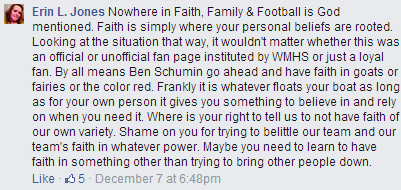
Jones basically reiterated what she said to Johnson, now directed at me. Honestly, knowing that the page is unofficial and run by an individual, my stance is that they can say whatever they want, and I said as much. My only concern was in the branding. I’m not saying that anyone should or should not say something, or is or is not allowed to say something. I’m just suggesting that it is worthwhile to make it clear about who is speaking.
And finally, from Sandy Marshall Shifflett:

This is a viewpoint that I wasn’t expecting, because I don’t believe that this has anything to do with money, and whether or not one is getting paid to post, or doing so for free. It has more to do with who the person at the other end of the connection is speaking for.
So all in all, my lesson from January on how to brand yourself properly rings true in a real-life example. This entire incident could have been avoided if the page owner had branded the page as unofficial right out of the gate. Don’t get me wrong – unofficial fan pages are great. Because they’re a labor of love rather than the official marketing arm of the entity, the content is often much richer and more detailed than one would find in the official materials. However, fan pages should always do their best to keep their status as unofficial pages prominent, in order to avoid confusion.
Categories: Religion, Social media, Some people
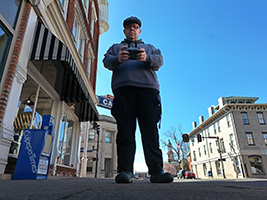









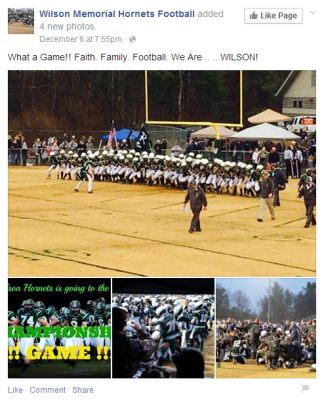
Leave a Reply